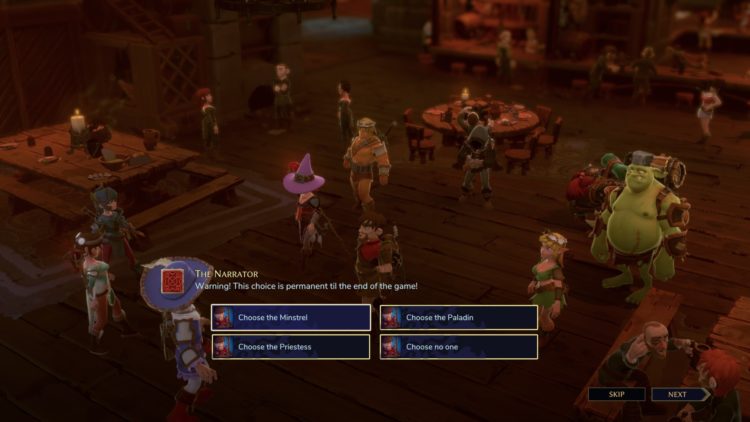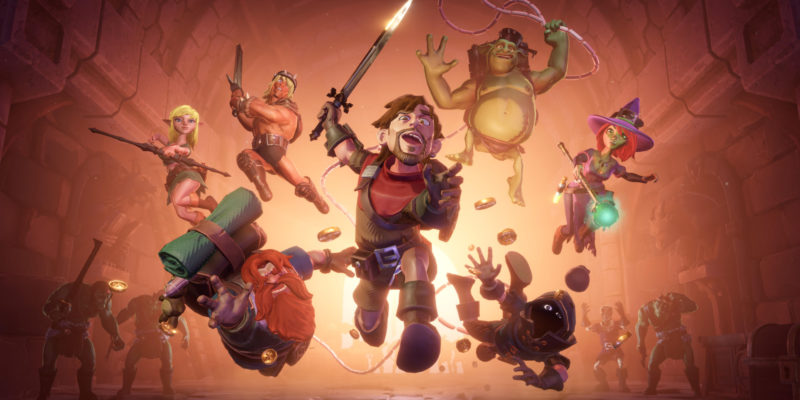The Dungeon of Naheulbeuk: The Amulet of Chaos, a turn-based tactical RPG from Artefacts Studio and Dear Villagers, releases tomorrow via Steam. Truth be told, I was a little bit apprehensive when Andrew Farrell initially asked me to review it. After all, I’m Filipino and I’ll probably have a hard time pronouncing the name of the dungeon itself.
Still, as I continued onward with the review, I did find a lot to like about the game. Just as well, I also found a few issues that became prevalent the more I progressed. In effect, The Dungeon of Naheulbeuk: The Amulet of Chaos started off strong, but it wore out its welcome over time.
Welcome to the dungeon
The plot of The Dungeon of Naheulbeuk: The Amulet of Chaos is fairly simple enough. A band of adventurers enters the titular dungeon only for things to go awry thanks to a cursed amulet. The item, which corrupts the minds of fighters, needs to have its enchantment removed fast.
That’s where your journey begins, and it mostly consists of going up and down various floors. Tilesets for each floor tend to vary, so you won’t feel as though each environment becomes repetitive at least for the first few hours.
For example, the ground floor looks like your typical ruined castle. Then, surprise, the second floor is a sprawling tavern. It even has an inn that lets you rest and buy potions and equipment. Other environments include an ice cavern, a gambling den, a roof deck, a mysterious library, and even a Dwarven keep filled with “Chaos Dwarfs.”
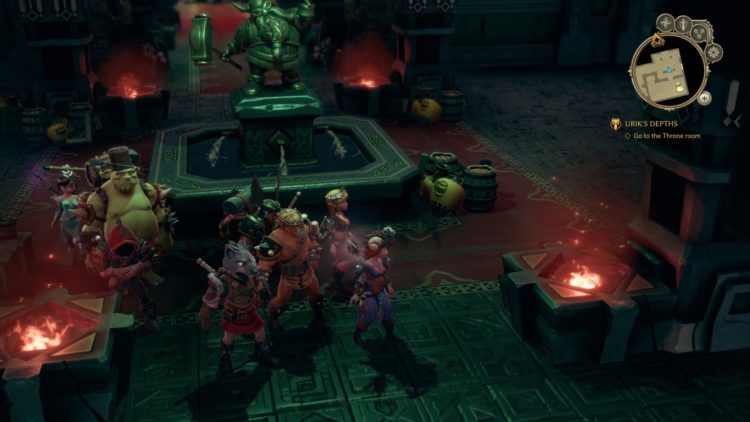
A wacky, weird world
If that last part caught you off-guard, believe me, I was quite surprised as well. Apparently, the game is based on Le Donjon de Naheulbeuk, a free, fan-made audio and comic book series from France. The source material itself takes liberties with countless references to fantasy tropes and pop culture.
For instance, some NPCs and items will remind you of The Lord of the Rings—such as Gulardiel’s Epic Bow or the wandering wizard Midranthir the Magnificent. Moreover, there are nods to Warhammer Fantasy such as the aforementioned Chaos Dwarfs as well as bastardized names for Slaanesh and Tzeentch. Item descriptions themselves tend to be hilarious. There are even items based on real-life personalities like Chef Gordan Ramzi’s Loincloth worn by your Ogre teammate.
Apart from item and skill descriptions, you’re going to find a lot of weirdness in your surroundings too. At one point, you’re invited to an “orgy” of sorts (complete with masks and a reference to the movie Eyes Wide Shut). There are moments involving a “game show,” rude dungeon denizens, as well as battles with a lot of hostile chickens. In addition to these, there are several puzzles for you to complete to obtain more loot.
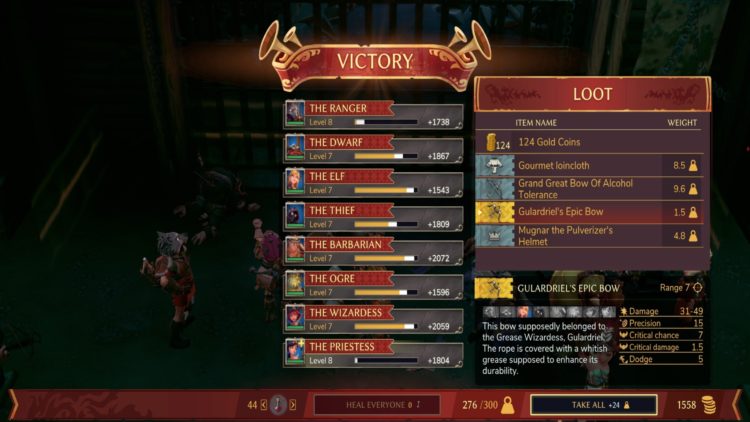
Banter brigade
The Ogre I mentioned above is just one of eight party members you’ll have in The Dungeon of Naheulbeuk. Your party is rounded out by the Ranger, Elf, Dwarf, Thief, Barbarian, and Wizardess. That last spot is entirely dependent on you as you’ll be given a choice between the Paladin, Priestess, and Minstrel on who joins your escapades all the way to the end of the game.
This is yet another treat as every character has a quirky and whimsical personality. The Dwarf cusses out everyone as he clamors for more gold. The Elf, meanwhile, fins lots of stuff icky. The Barbarian is too headstrong for his own good, the Ranger is easily distracted by the ladies, the Priestess thinks her teammates are peasants, and the Thief is a loner who complains whenever he’s ignored.
It goes without saying that The Dungeon of Naheulbeuk’s writing and dialogue have a lot of comedy, heart, and crassness; you’re bound to chuckle and smile from time to time. Your companions will banter and insult, whine and laugh, cheer and rage —all these interactions prove to be worthwhile enjoyments throughout your playthrough. I was getting The Bard’s Tale and Monkey Island vibes because of all the goofy and silly antics going on.
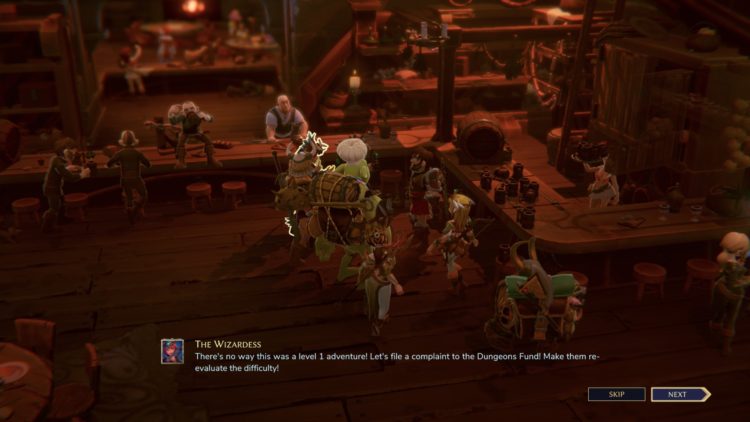
The Dungeon of Naheulbeuk‘s core mechanics and combat
The Dungeon of Naheulbeuk: The Amulet of Chaos is, as cited earlier, a turn-based tactical RPG. Movement in-game is akin to a CRPG or ARPG with your point-and-click control scheme (and using a gamepad is also possible). When you enter a battle, though, it changes to a tactical affair. This is your typical XCOM-style scheme where you move units on tiles, manage your action points (AP), cast skills, and so on.
It’s simple enough to get into, but there are intricacies that’ll keep you engaged. First and foremost are your attributes and the core combat mechanics. Attributes include the character’s agility (accuracy/precision), strength (physical damage), intelligence (magical damage), and courage (initiative). The courage stat is fairly important since initiative determines the “turn order” system.
Think of this concept as akin to what you’ve seen in Wasteland 2, the XCOM spinoff Chimera Squad, and the recent Othercide. Units take their turns based on the courage/initiative stat, and that allows you to control the battlefield the way you see fit.
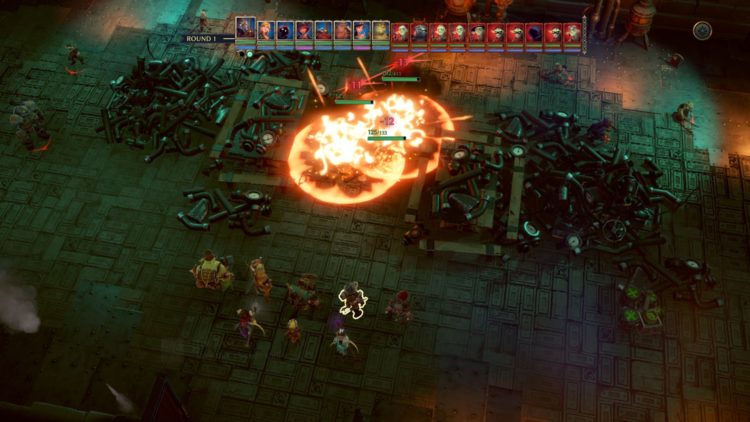
Complementing your characters
Moreover, various skills and mechanics complement your characters. Let’s say you have the Ranger and Elf next to each other—that means they could gain initiative boosts thanks to a passive. Meanwhile, the Ogre and Barbarian get different buffs when adjacent to one another. The Ogre could even toss the Dwarf via a particular skill, and you could follow that with the Dwarf’s own abilities (such as battering down enemies or striking everything around him with a whirlwind spin).
Additional mechanics come into play such as having an “attack of opportunity,” status effects, destructible objects, battlefield traps, overwatch (it’s almost a given in this genre), and “push attacks” (which trigger overwatch and attacks of opportunity). You’ve even got “critical failures” that can occur, leading to disastrous moments such as freezing or stunning yourself. There are also the “Randomia” buffs that gain charges depending on the unlucky moments that happened during all your fights. These selections range from giving you extra AP to letting you teleport a character.
The AI tends to be quite smart too. If most of your foes are dead or low on health, you can expect the remaining mobs to retreat (lessening the loot you obtain). Likewise, hostiles will beeline for your characters with the lowest health, or they’ll prioritize interrupting those that are on overwatch if possible. Assuming only one opponent is left and they can’t escape, they’ll stay in a corner, avoiding overwatch triggers or push attacks.
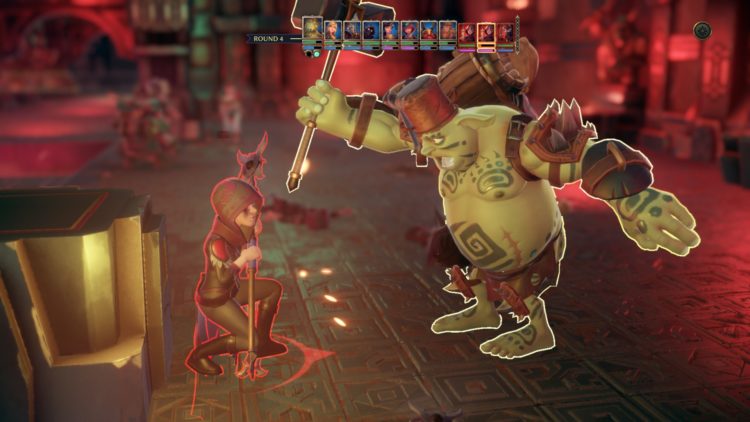
The waiting game
The Dungeon of Naheulbeuk already has the tactical depth that kept me engaged. The downside was that there’s a nasty bug that kept rearing its ugly head fairly often while I was reviewing the game. It’s actually similar to the issue I had with Necromunda: Underhive Wars—it’s when the AI gets stuck while taking its turn.
In The Dungeon of Naheulbeuk, this can happen if you’ve got multiple units on overwatch and the AI tries to wade through your projectiles. Even though there’s an option to speed up the animations of friendlies and hostiles, your opponent might slow down to a crawl. Sometimes, this problem might happen when an opponent is suffering from status effects and it takes a while to act. Alternatively, it might arise after you kill a miniboss and cause all other mobs to die. The “victory” screen takes a long time to pop-up, and any scene that follows that won’t even fire.
Playing the waiting game is useless, and you’ve no choice but to relaunch the game and reload your last save. Coincidentally, the autosave feature means you’ll restart from the last round of the fight, so just make sure to switch up your moves to avoid any mishaps. Still, I can’t stress enough how this had become quite a nuisance during my playthrough given that I had to do this “quick fix” a dozen times.
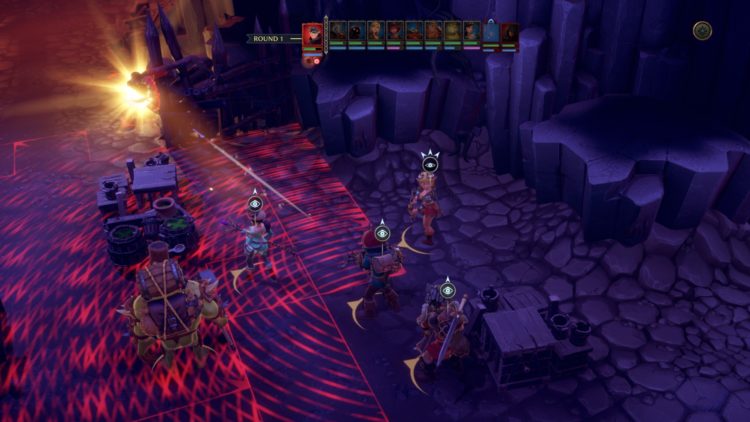
What’s next?
There’s also another problem that I’ve experienced towards the end of The Dungeon of Naheulbeuk‘s campaign. After defeating a miniboss and his cohorts, I was tasked with investigating a secret room in the cellars. Unfortunately, I couldn’t interact with anything except for a chest and a bookshelf. I’ve already grabbed the items from the former, and there were no quest items inside. Likewise, I haven’t found the books required for the latter, and I doubt the game expects me to check out every nook and cranny of each floor again.
That, in itself, is yet another shortcoming. There’s a lot of backtracking in previous areas you’ve already been to whether it’s part of the main quest or a random sidequest. Although each floor seems refreshing at first glance, it becomes a repetitive chore by the time you’ve played 18 hours or more.
Speaking of backtracking, I ended up having to replay a previous chapter and go through all the fights again. Once I did reach the secret room in the cellars, that’s when a new object (a pentagram) appeared. Inspecting it finally allowed me to proceed to the game’s closing chapter. In any case, I’m not sure if this bug will be present in future playthroughs once the game is released, but do take note of it just in case.
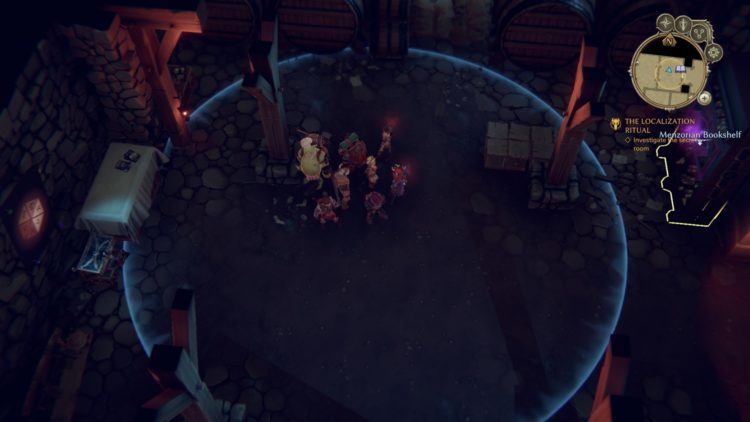
Delving deeper
A few more battles followed that until I eventually defeated The Dungeon of Naheulbeuk‘s final boss. I thought there’d be a New Game+ mode awaiting me, perhaps a means of recruiting the Paladin or Minstrel since I chose the Priestess earlier. Instead, there was no such mode. That was quite disappointing.
Ultimately, however, The Dungeon of Naheulbeuk: The Amulet of Chaos will wow you at first thanks to its ludicrous and hammy dialogue and its wacky cast of characters. Similarly, you’ll find a lot of engagement due to its combat mechanics and tactics. Sadly, the further you push onward, the more tedious and wearisome it gets with linearity, repetitiveness, and slowdown-reload routines grinding your gears.
